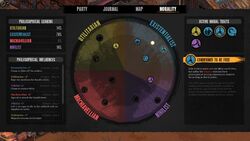Tim Cain - A Christmas Lesson on CRPG Design
Tim Cain - A Christmas Lesson on CRPG Design
Editorial - posted by Saint_Proverbius on Mon 25 November 2002, 22:21:41
Tags: Tim Cain; Troika GamesEvery year at Troika Games we have a gift exchange at Christmas time (or Hanukah or Kwanzaa, depending on who you ask). The rules are very simple. Each person buys a gift for some pre-arranged amount of money, usually twenty dollars or so. They wrap it and place it under our Christmas tree (or Hanukah bush or Kwanzaa shrub). On the last day of work before the holidays, we draw lots to see what order we get to pick our gifts. It seems straight forward enough, but there's a catch. Instead of picking a gift from under the tree on your turn, you can choose to steal a gift from someone who has already unwrapped one. The victim then gets a choice to take another gift from under the tree or to steal a gift from someone who hasn't been robbed yet that turn. So, a particular turn isn't over until someone takes an unwrapped gift from the tree, either because they don't see a gift they want to steal or because every gift has been stolen once already. The whole event can be crazy and a little tumultuous, but everyone has a fun time.
I've learned a lot about CRPG design from this event.
One lesson is obvious: always steal the best things you can. Every CRPG designer "borrows" heavily from past works, especially features that have become popular and even expected in a game. Remember when auto-mapping wasn't a standard feature in a CRPG? Conversely, a designer should expect his good ideas eventually to appear in his competitor's games. Don't get upset at this. Imitation is the most sincere form of flattery.
Another lesson that should be obvious: turn-based games are still fun. Despite the plethora of real-time computer games on the market, there is still satisfaction in playing a game in the old-fashioned turn-based method we all grew up with. Some newer games seem to be real-time for no other reason than because real-time is more modern. Why make a real-time D&D computer game, which requires you to ignore or change all of the rules having to do with D&D's inherently turn-based nature? I am surprised no one has made a real-time chess game. I'll even give you a good name for it: "Xtreme Chess" And don't forget the sticker: "Now With Phat Lewt".
But some lessons I have learned from the gift exchange are more subtle. For example, some people spend a lot of time picking out their gift, sometimes thinking about gift ideas for months before the exchange party, while other people just grab something during their lunch hour on the day of the party. There seems to be no correlation between how much time someone spends picking out a gift and how popular the gift is (where I base a gift's popularity on how many people try to steal it). Sometimes a gift is really popular, and sometimes it's not, and it's hard to tell beforehand what people will really want.
Making an RPG is similar. You can have a lot of ideas, but until you implement them and see how others like them, it's hard to tell what people will like. Some people think that spending a lot of time on a feature makes it good. In fact, I have seen truly awful ideas that a person has spent months developing, and I have seen wonderful ideas that have been implemented in five minutes. Again, you can't always predict what will be fun and what will not. You try your best and must be willing to accept criticism.
Sometimes people buy gifts for the exchange that they personally would like to receive. Usually, they figure that their friends have similar tastes and would like the gift too, or maybe they are just being cynical and buy it to ensure that there will be at least one gift that they will want to steal.
In the same vein, designers often add the features they personally enjoy, usually with the same justifications. People similar to them will like it, they figure, and if they don't, "well, I'm the designer and it's going in because I like it." Just because you like a feature doesn't mean it should stay in the game. If play testers find the feature confusing, tedious, or just plain worthless, then change it or throw it out.
Finally, there is always the person who brings the strangest gift to the party and afterwards claims to have had a dozen good ideas but couldn't find any of them at the mall. For a CRPG, this experience reminds me of the old adage that ideas are a dime a dozen. It's easy to have an idea. It's harder to implement it, and even harder to take criticism to improve it, especially when there is a temptation to "ship the game already. It's done and bug-free". This may be true, but if the game is not fun, then it?s not done.
For the record, the most popular gift ever at a Troika gift exchange was an alligator cookie jar that when opened would say in a Cajun accent "hmm, hmm, them sure is some tasty cookies!"
Remember, there is no accounting for taste, in gifts or game design.
Thanks to Tim Cain of Troika for being the first to submit us such an article. Mr. Cain is best known for his role in design and programming on Fallout and Arcanum.
There are 20 comments on Tim Cain - A Christmas Lesson on CRPG Design















